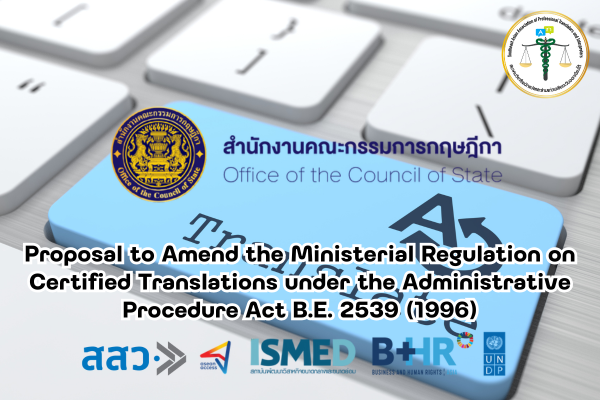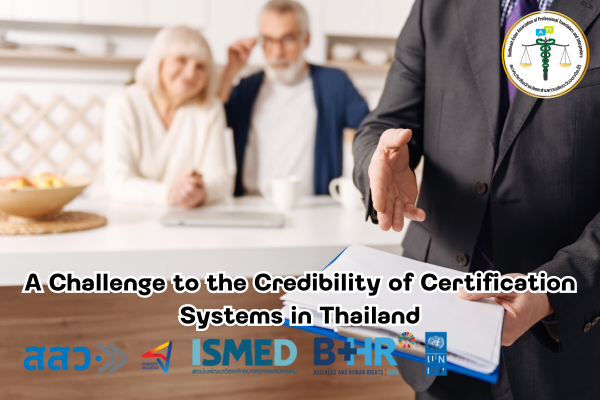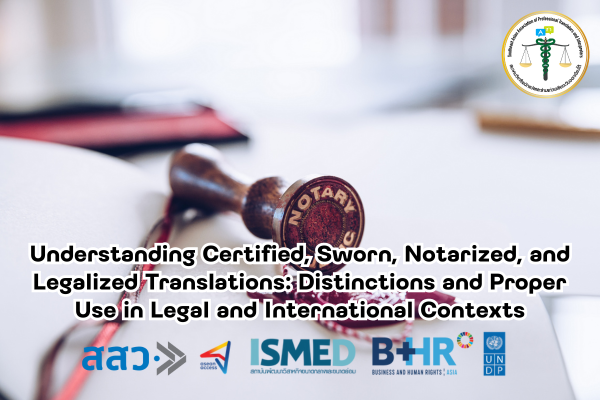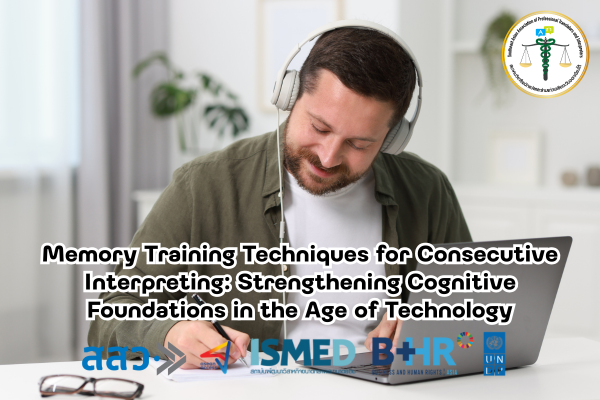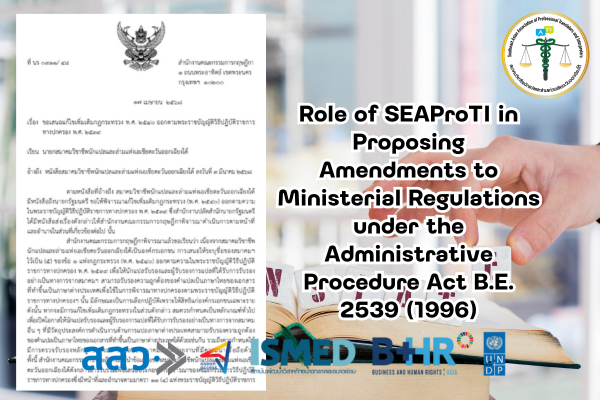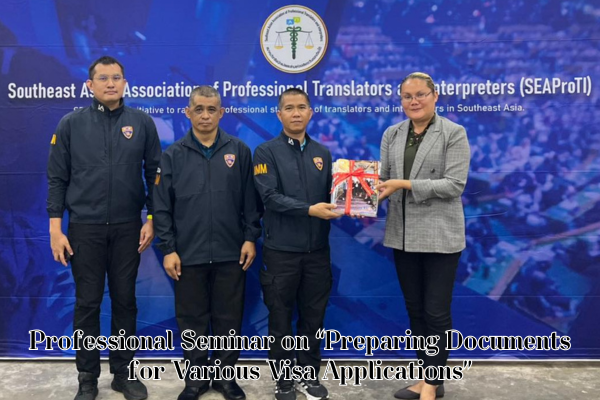Proposal to Amend the Ministerial Regulation on Certified Translations under the Administrative Procedure Act B.E. 2539 (1996)
18 April 2025, Bangkok – In the current administrative practice in Thailand, the recognition of certified translations is limited to a narrow set of individuals and institutions. The existing regulation under the Ministerial Regulation B.E. 2540 (1997), issued pursuant to the Administrative Procedure Act B.E. 2539 (1996), does not account for certified translators from professional private associations, resulting in limited access and flexibility for the public and private sectors.
Proposal Summary
A proposal has been submitted to add a new clause (5) to Section 1 of the Ministerial Regulation B.E. 2540, allowing certified translators and translation verifiers registered with recognized professional associations such as the Southeast Asian Association of Professional Translators and Interpreters (SEAProTI) to legally certify translations of foreign documents into Thai for use in administrative procedures within Thailand.
Key Recommendations
1. Expand Eligibility Criteria
Allow certified translators and translation verifiers officially recognized by professional associations with expertise in foreign language translation to certify translations for administrative purposes.
2. Accreditation of Training Programs
Introduce a standard framework for translator training courses developed by professional associations. These courses should be reviewed and accredited by a credible national authority.
3. Proposed Oversight Body
The Ministry of Education is suggested as the central authority responsible for the accreditation of such translation training courses due to:
- It’s national credibility and impartiality
- Its alignment to use translated documents in government procedures
- It has an existing role in regulating educational and training standards.
Existing Challenges
- Current regulation restricts certification to university language graduates, instructors of the respective language, or diplomatic officials.
- Excludes certified translators from private associations, limiting access to competent professionals.
- No recognition of quality-assured private-sector training programs or transparent qualification systems.
Advantages of the Proposed Amendment
1. Professional Inclusivity
Recognizes professional translators who may not have traditional academic backgrounds but have proven their competence through association certification.
2. Improved Accessibility
Enables government bodies and the public to access a wider pool of certified translators through trusted professional associations.
3. National Standardization
Establishes a nationally recognized standard for translation training, with verified curricula improving public trust and institutional reliability.
4. Alignment with Good Governance and Human Rights
Promotes fair access to the profession for qualified individuals under a common quality framework.
Guidance from the Office of the Council of State (as of 17 April 2025)
The proposal is under review and is being considered for inclusion in the amendment of the ministerial regulation.
Likely outcomes include:
- More institutions and associations are being able to conduct certified translation training.
- Clearer national guidelines for course content, quality, and verification.
- Enhanced trust in certified translations used in administrative matters.
Limitations Noted
Certified translations will still be valid for domestic use only under the Administrative Procedure Act and may not be recognized abroad.
The specific mechanism for curriculum development remains unclear:
- Either the verifying authority develops its training program, or
- Associations develop the course and submit it for independent review and approval.
Conclusion
While the proposal to amend the Ministerial Regulation is still under consideration, the inclusion of clause (5) would represent a significant reform. It would allow translations certified by translators affiliated with credible private professional associations to be officially recognized in administrative processes.
Anticipated Benefits
- Broader Professional Recognition
Individuals certified by private associations like SEAProTI can legally certify translations regardless of academic background.
- Stronger Domestic Credibility
Thailand’s government agencies and private entities will gain access to a wider network of trusted translation professionals.
- Pathway to International Recognition
Certified translators working under standards aligned with international norms may be more likely to gain recognition abroad.
This proposed amendment marks a meaningful step toward modernization, inclusivity, and quality assurance in Thailand’s translation certification landscape.
Key Observations:
1. The proposed amendment to the Ministerial Regulation, under the Administrative Procedure Act B.E. 2539 (1996), by adding clause (5) to Section 1 of the Ministerial Regulation B.E. 2540 (1997), is not related to the definition or establishment of professional translation standards.
2. The proposed amendment applies solely within Thailand. Its purpose is to support the use of translated documents in dealings with Thai government agencies. It does not concern the setting of professional standards for translations intended for use abroad.
Observations from the Office of the Council of State
Following consultations and the review of proposals regarding the amendment of the Ministerial Regulation on certified translations under the Administrative Procedure Act B.E. 2539 (1996), the Office of the Council of State has made the following general observations:
1. There was a case of a professional association that was established but later ceased its operations. The lack of continuity raised concerns about the sustainability of assigning responsibilities for translation certification to private sector entities without formal oversight from a government agency.
2. In another case, an association initially committed to promoting translation and interpreting for national benefit later shifted the direction of its activities away from its original objectives. This led to uncertainty regarding the association’s long-term position and mission.
Given these circumstances, the Office of the Council of State recommends that a credible government agency be assigned direct responsibility for overseeing this matter to ensure stability, transparency, and standards that are subject to ongoing review.
This implementation would be carried out under a Royal Decree or through the issuance of a Ministerial Regulation or official announcement, in accordance with the Administrative Procedure Act, clearly defining a national framework that is impartial, transparent, and comprehensive.
SEAProTI’s certified translators, translation certification providers, and certified interpreters:
The Southeast Asian Association of Professional Translators and Interpreters (SEAProTI) has officially announced the criteria and qualifications for individuals to register as “Certified Translators,” “Translation Certification Providers,” and “Certified Interpreters” under the association’s regulations. These guidelines are detailed in Sections 9 and 10 of the Royal Thai Government Gazette, issued by the Secretariat of the Cabinet under the Office of the Prime Minister of the Kingdom of Thailand, dated July 25, 2024, Volume 141, Part 66 Ng, Page 100.
To read the full publication, visit: the Royal Thai Government Gazette
ข้อเสนอแนะแนวทางแก้ไขเพิ่มเติมกฎกระทรวง ว่าด้วยการรับรองการแปลออกตามความในพระราชบัญญัติวิธีปฏิบัติราชการทางปกครอง พ.ศ. 2539 แก้ไขเพิ่มเติม ให้มี (5) ของข้อ 1 แห่งกฎกระทรวง (พ.ศ. 2540)
18 เมษายน 2568, กรุงเทพมหานคร – ในกระบวนการรับรองเอกสารแปลโดยหน่วยงานราชการและองค์กรภาคธุรกิจ จำเป็นต้องมีหลักเกณฑ์ที่ชัดเจนและโปร่งใส เพื่อให้สามารถใช้คำแปลจากนักแปลที่ผ่านการรับรองอย่างเป็นทางการได้อย่างถูกต้องตามกฎหมาย
ข้อเสนอเพื่อการแก้ไขเพิ่มเติมกฎกระทรวง
กำหนดหลักเกณฑ์ทั่วไป เพื่อเปิดโอกาสให้นักแปลรับรองและผู้รับรองการแปลจากสมาคมวิชาชีพนักแปลและล่ามแห่งเอเชียตะวันออกเฉียงใต้ สามารถรับรองคำแปลเอกสารต่างประเทศเป็นภาษาไทย ที่ใช้ในวิธีปฏิบัติราชการทางการปกครองในประเทศไทย ได้อย่างถูกต้องตามกฎหมาย
กำหนดมาตรฐานการตรวจรับรองหลักสูตรอบรมการแปล โดยให้สมาคมจัดทำหลักสูตรอบรมการแปล และให้มีหน่วยงานกลางที่มีความน่าเชื่อถือรับรองคุณภาพของหลักสูตรดังกล่าว เพื่อยกระดับมาตรฐานวิชาชีพ เบื้องต้น และเป็นแนวคิด คือให้กระทรวงศึกษาธิการ เป็นผู้รับผิดชอบในการรับรองหลักสูตรอบรมการแปล
บริบทและปัญหาเดิม:
- กฎกระทรวงปัจจุบันจำกัดการรับรองคำแปลไว้เฉพาะบุคคล/หน่วยงานในวงแคบ เช่น ผู้ที่รับรองการแปลนั้นมีเฉพาะผู้ที่จบปริญญาตรีด้านภาษาเป็นอย่างน้อยเท่านั้น หรือผู้ที่จบปริญญาตรีสาขาใดก็ได้เป็นอย่างน้อย หรือเฉพาะอาจารย์ที่สอนภาษาต่างประเทศนั้น รวมถึงสถานทูตและกงสุลไทยในประเทศและต่างประเทศ
- ส่งผลให้ผู้ใช้บริการที่เป็นหน่วยงานรัฐไม่สามารถเข้าถึงนักแปลรับรองจากสมาคมวิชาชีพที่เป็นเอกชนมีมาตรฐานได้อย่างหลากหลาย
- ไม่รองรับระบบรับรองผู้เชี่ยวชาญที่มีคุณวุฒิจากหน่วยงานที่เป็นเอกชน ที่ดำเนินงานอย่างโปร่งใสและมีระบบตรวจสอบ
ข้อเสนอของสมาคม SEAProTI:
- ให้เพิ่มหลักเกณฑ์ทั่วไปที่เปิดโอกาสให้นักแปลรับรองและผู้รับรองการแปลที่ได้รับการรับรองอย่างเป็นทางการจากสมาคมอื่น ๆ ที่มีวัตถุประสงค์เกี่ยวกับงานแปล สามารถรับรองความถูกต้องของคำแปลเป็นภาษาไทยของเอกสารภาษาต่างประเทศได้
- เสนอให้มีระบบรับรองหลักสูตรการอบรม ของสมาคมวิชาชีพโดยหน่วยงานกลางที่น่าเชื่อถือ เพื่อยืนยันคุณภาพวิชาชีพ
- สอดคล้องกับหลักธรรมาภิบาลและหลักสิทธิมนุษยชนในการเปิดโอกาสให้ผู้มีความรู้ความสามารถสามารถประกอบวิชาชีพภายใต้กรอบมาตรฐานเดียวกัน
สถานะปัจจุบัน:
สำนักงานคณะกรรมการกฤษฎีการับทราบข้อเสนอแล้ว และอยู่ระหว่างนำไปพิจารณาประกอบการแก้ไขกฎกระทรวงต่อไป
คำแนะนำจาก สํานักงานคณะกรรมการกฤษฎีกา เมื่อวันที่ 17 เมษายน 2568 และผลที่คาดว่าจะเกิดขึ้น:
- เพิ่มความหลากหลายและความเชื่อมั่นในการรับรองคำแปล โดยให้นักแปลจากสมาคมต่าง ๆ ที่ดำเนินกิจการแปลภาษาต่างประเทศ และโรงเรียนสอนภาษา ต่าง ๆ สามารถเปิดหลักอบรมการแปลเอกสาร เพื่อนักแปลที่จบหลักสูตรนั้นจะสามารถรับรองการแปลได้ด้วย
- สร้างมาตรฐานกลางให้แก่หลักสูตรและผู้ประกอบวิชาชีพ โดยมีหน่วยงานกลางที่น่าเชื่อถือเข้ามาตรวจสอบและรับรองหลักสูตร
- อำนวยความสะดวกแก่ประชาชนและหน่วยงานที่ต้องใช้เอกสารแปลในการติดต่อราชการ
ข้อเสียในจากคำแนะนำจาก สํานักงานคณะกรรมการกฤษฎีกาเมื่อวันที่ 17 เมษายน 2568:
- เอกสารแปลที่รับรอง โดยผู้รับรองการแปล ตาม พระราชบัญญัติวิธีปฏิบัติราชการทางปกครอง พ.ศ. 2539 แก้ไขเพิ่มเติม พ.ศ. 2540 ใช้เฉพาะในประเทศไทยเท่านั้น ไม่ได้รับการยอมรับในต่างประเทศ
- หลักสูตรที่ สํานักงานคณะกรรมการกฤษฎีกา ยังไม่ชัดเจนว่า จะเป็นหลักสูตรการแปลเอกสารใด มีความเป็นได้ 2 อย่างคือ 1) สํานักงานคณะกรรมการกฤษฎีกา หรือ หน่วยงานกลางที่ตรวจสอบและรับรองหลักสูตรนั้นเป็นผู้ออกหลักสูตรเอง และ 2) ให้สมาคมหรือโรงเรียนสอนภาษาเป็นผู้เขียนหลักสูตรการแปลเอกสารเอง และนำไปให้หน่วยงานที่มีอำนาจในการตรวจสอบหลักสูตรเป็นผู้ตรวจสอบหลักสูตรและรับรองหลักสูตรอีกครั้ง
เพื่อให้การรับรองหลักสูตรการฝึกอบรมการแปลมีความน่าเชื่อถือและเป็นที่ยอมรับในระดับประเทศ หน่วยงานกลางที่เหมาะสมในการทำหน้าที่ตรวจรับรองหลักสูตรการแปลเอกสาร อาจกำหนดให้เป็น กระทรวงศึกษาธิการ ซึ่งมีคุณสมบัติดังนี้:
o เป็นหน่วยงานภาครัฐที่มี บทบาทด้านการกำกับดูแลมาตรฐานทางการศึกษาในประเทศไทย
o มี ความน่าเชื่อถือในระดับประเทศ เป็นกลาง และสามารถตรวจสอบคุณภาพของหลักสูตรฝึกอบรมด้านการแปลได้อย่างเป็นระบบ
o สอดคล้องกับ วัตถุประสงค์ของการแปลเอกสาร ซึ่งมักใช้ในการ ติดต่อราชการภายในประเทศ เช่น การยื่นคำขอราชการ การสมัครงานในหน่วยงานรัฐ หรือการยื่นเอกสารประกอบการพิจารณาของส่วนราชการต่าง ๆ
o การกำหนดให้กระทรวงศึกษาธิการเป็นหน่วยงานกลาง จะช่วย ยกระดับหลักสูตรการแปลเอกสาร และสร้างความมั่นใจให้แก่หน่วยงานราชการที่รับเอกสารแปลเพื่อประกอบการพิจารณาในกระบวนการทางปกครอง
สรุปส่งท้าย
ข้อเสนอการแก้ไขเพิ่มเติมกฎกระทรวง: การรับรองการแปลโดยนักแปลรับรองจากภาคเอกชน แม้ข้อเสนอแนะแนวทางการแก้ไขเพิ่มเติมกฎกระทรวง ว่าด้วยการรับรองการแปล (ออกตามความในพระราชบัญญัติวิธีปฏิบัติราชการทางปกครอง พ.ศ. 2539) จะยังอยู่ระหว่างการพิจารณาและยังไม่ได้ข้อยุติอย่างเป็นทางการ แต่แนวทางที่เสนอให้เพิ่มเติม ข้อ (5) ในข้อ 1 ของกฎกระทรวง พ.ศ. 2540 เพื่อเปิดทางให้สามารถใช้เอกสารแปลและรับรองการแปลที่จัดทำโดยนักแปลรับรองและผู้รับรองการแปลที่ขึ้นทะเบียนกับสมาคมวิชาชีพในภาคเอกชน มีข้อดีอย่างชัดเจนในหลายมิติ ได้แก่:
ข้อดีของการแก้ไขเพิ่มเติมกฎกระทรวงนี้
เปิดกว้างทางวิชาชีพ:
นักแปลรับรองและผู้รับรองการแปลที่สังกัดหน่วยงานเอกชน ไม่จำกัดวุฒิการศึกษาหรือสาขาที่จบ สามารถปฏิบัติหน้าที่แปลและรับรองเอกสารได้ หากผ่านกระบวนการรับรองมาตรฐานของสมาคมที่น่าเชื่อถือ
เพิ่มการยอมรับในประเทศ:
นักแปลที่ได้รับการรับรองจากสมาคมวิชาชีพอย่าง SEAProTI จะได้รับการ ยอมรับจากหน่วยงานราชการและภาคเอกชนในประเทศ ในฐานะผู้เชี่ยวชาญด้านการแปลและการรับรองเอกสารที่ได้มาตรฐาน
รองรับมาตรฐานระดับสากล:
ด้วยข้อบังคับของสมาคมวิชาชีพที่มีมาตรฐานเทียบเท่าหรือได้รับการยอมรับในระดับนานาชาติ นักแปลรับรองที่ได้รับการรับรองจาก SEAProTI จะมี โอกาสได้รับการยอมรับจากหน่วยงานต่างประเทศ มากยิ่งขึ้น
ข้อสังเกตุสำคัญ:
1. ข้อเสนอแนะแนวทางการแก้ไขเพิ่มเติมกฎกระทรวง ว่าด้วยการรับรองการแปล ตามพระราชบัญญัติวิธีปฏิบัติราชการทางปกครอง พ.ศ. 2539 โดยเพิ่มเติมข้อ (5) ในข้อ 1 ของกฎกระทรวง (พ.ศ. 2540) ไม่ได้มีวัตถุประสงค์เพื่อกำหนดหรือรับรองมาตรฐานวิชาชีพนักแปล
2. ข้อเสนอแนะแนวทางการแก้ไขเพิ่มเติมกฎกระทรวงดังกล่าว มีผลบังคับใช้เฉพาะในประเทศไทย เพื่อรองรับการใช้เอกสารแปลในการติดต่อหน่วยงานราชการไทยเท่านั้น ไม่เกี่ยวข้องกับมาตรฐานวิชาชีพที่ใช้ในบริบทระหว่างประเทศ หรือการแปลเอกสารเพื่อใช้งานในต่างประเทศ
ข้อสังเกตจากการรับฟังความคิดเห็นของสำนักงานคณะกรรมการกฤษฎีกา
จากการหารือและรับฟังข้อเสนอแนะเกี่ยวกับการแก้ไขเพิ่มเติมกฎกระทรวงว่าด้วยการรับรองการแปลตามพระราชบัญญัติวิธีปฏิบัติราชการทางปกครอง พ.ศ. 2539 สำนักงานคณะกรรมการกฤษฎีกามีข้อสังเกตในภาพรวม ดังนี้:
- มีกรณีของสมาคมวิชาชีพแห่งหนึ่งที่ได้ก่อตั้งขึ้นแต่ต่อมาได้ยุติบทบาทลง การดำเนินงานขาดความต่อเนื่อง จึงทำให้เกิดความกังวลเกี่ยวกับความยั่งยืนของการมอบหมายภารกิจด้านการรับรองคำแปลให้แก่ภาคเอกชนโดยไม่มีหน่วยงานของรัฐกำกับดูแลอย่างเป็นทางการ
- มีกรณีของสมาคมอีกแห่งหนึ่งเปลี่ยนแนวทางในการดำเนินกิจกรรมด้านการแปลและการล่ามเพื่อประโยชน์ของประเทศ แต่ในระยะต่อมา ทิศทางของกิจกรรมของสมาคมได้เปลี่ยนไปจากจุดมุ่งหมายเดิม จึงทำให้เกิดความไม่ชัดเจนในจุดยืนและภารกิจของสมาคมในระยะยาว
ด้วยเหตุนี้ สำนักงานคณะกรรมการกฤษฎีกาจึงเห็นควรให้ มีหน่วยงานของรัฐที่มีความน่าเชื่อถือเป็นผู้รับผิดชอบในเรื่องนี้โดยตรง เพื่อให้เกิดความมั่นคง โปร่งใส และมีมาตรฐานที่สามารถตรวจสอบได้อย่างต่อเนื่อง
ทั้งนี้ การดำเนินการดังกล่าวจะอยู่ภายใต้การตราพระราชกฤษฎีกา หรือการออกกฎกระทรวงหรือประกาศที่เกี่ยวข้องตามพระราชบัญญัติวิธีปฏิบัติราชการทางปกครองฯ โดยกำหนดกรอบให้มีความชัดเจน เป็นกลาง และครอบคลุมในระดับประเทศ
เกี่ยวกับนักแปลรับรอง ผู้รับรองการแปล และล่ามรับรองของสมาคมวิชาชีพนักแปลและล่ามแห่งเอเชียตะวันออกเฉียงใต้
สมาคมวิชาชีพนักแปลและล่ามแห่งเอเชียตะวันออกเฉียงใต้ (SEAProTI) ได้ประกาศหลักเกณฑ์และคุณสมบัติผู้ที่ขึ้นทะเบียนเป็น “นักแปลรับรอง (Certified Translators) และผู้รับรองการแปล (Translation Certification Providers) และล่ามรับรอง (Certified Interpreters)” ของสมาคม หมวดที่ 9 และหมวดที่ 10 ในราชกิจจานุเบกษา ของสำนักเลขาธิการคณะรัฐมนตรี ในสำนักนายกรัฐมนตรี แห่งราชอาณาจักรไทย ลงวันที่ 25 ก.ค. 2567 เล่มที่ 141 ตอนที่ 66 ง หน้า 100 อ่านฉบับเต็มได้ที่: นักแปลรับรอง ผู้รับรองการแปล และล่ามรับรอง


